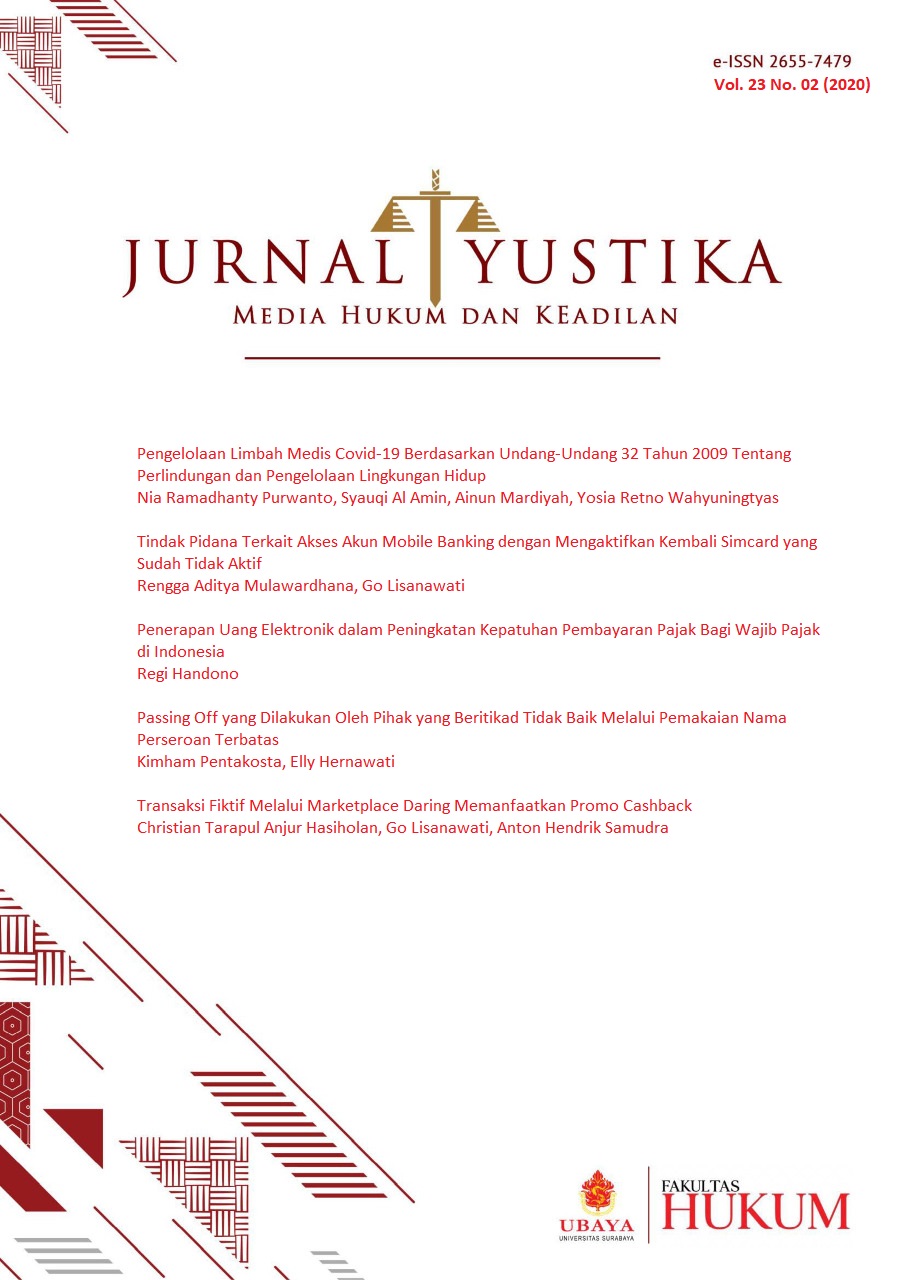Passing Off yang Dilakukan Oleh Pihak yang Beritikad Tidak Baik Melalui Pemakaian Nama Perseroan Terbatas
 Abstract Views:
517 times
Abstract Views:
517 times
 PDF Downloads:
485 times
PDF Downloads:
485 times
Abstract
This paper focuses on the similarity of functions between Trademarks and Limited Liability Company Name, namely quality assurance function, which enables both to provide a guarantee on the reputation of goods and/or services offered to the consumer. Such similarity of functions between those two different legal terminology opens a loophole for any party, based on bad faith, to conduct passing off towards a registered trademarks owned by another party through the use of a limited liability company name. This paper shows the urgency of a harmonization and integration between the mechanism of applying for Trademark registration and the submission of the name of a limited liability company in Indonesia. Therefore, this paper will examine and criticize the laws and regulations relating to the two terminology above, inter alia the Law Number 20 of 2016 regarding Trademarks and Geographical Indications and the Government Regulation Number 43 of 2011 regarding Procedures for Filing and Use of Limited Liability Company Name. This paper concludes that the government of the Republic of Indonesia must immediately amend the regulation on the requirements for submitting the name of a limited liability company, by requiring the Directorate General of General Legal Administration to reject the name of a limited liability company that uses a name that has been registered as a brand by another party.
Downloads
References
Buku:
Elmer William Hanak, III, 1974, The Quality Assurance Function of Trademarks, 43 FordhamL.
J. Satrio, 2020, Perseroan Terbatas (Yang Tertutup) Berdasarkan U.U. No. 40 Tahun 2007, Bagian Pertama, Rajawali Press, Depok.
Julius Rizaldi, 2009, Perlindungan Kemasan Produk Merek Terkenal Terhadap Persaingan Curang di Indonesia dikaitkan dengan Undang-undang Merek dan TRIPs-WTO, PT. Alumni, Bandung.
Lionel Bently & Brad Sherman, 2009, Intellectual Property Law, Oxford University Press Inc., New York, Amerika Serikat.
Maria Farida Indrati S., 2007, Ilmu Perundang-undangan Proses dan Teknik Pembentukannya – Jilid 2, Kanisius, Daerah Istimewa Yogyakarta.
Muhammad Djumhana & Djubaeda, 2003, Hak Milik Intelektual, Sejarah Teori dan Prakteknya di Indonesia, PT Citra Aditya Bakti, Bandung.
Rahmi Jened, 2015, Hukum Merek Trademark Law Dalam Era Global & Integrasi Ekonomi, Kencana, Surabaya.
-------, 2007, Hak Kekayaan Intelektual Penyalahgunaan Hak Eksklusif, Airlangga University Press, Surabaya.
Wirjono Prodjodikoro, 2000, Perbuatan Melanggar Hukum Dipandang dari Sudut Hukum Perdata, CV Mandar Maju, Bandung.
Artikel Jurnal:
Agung Sujatmiko, 2010, Prinsip Hukum Penyelesaian Pelanggaran Passing Off Dalam Hukum Merek, Yuridika Vol. 25 No. 1.
Dio Shafreeza Sunny, 2014, Tanggung Gugat Produsen Pemilik Produk yang Melakukan Pemboncengan Reputasi (Passing Off), Universitas Airlangga, Surabaya.

This work is licensed under a Creative Commons Attribution-ShareAlike 4.0 International License.
All articles published in YUSTIKA are licensed under a Creative Commons Attribution-ShareAlike 4.0 International (CC BY-SA) license. This means anyone is free to copy, transform, or redistribute articles for any lawful purpose in any medium, provided they give appropriate attribution to the original author(s) and YUSTIKA, link to the license, indicate if changes were made, and redistribute any derivative work under the same license.
Copyright on articles is retained by the respective author(s), without restrictions. A non-exclusive license is granted to YUSTIKA to publish the article and identify itself as its original publisher, along with the commercial right to include the article in a hardcopy issue for sale to libraries and individuals.
Although the conditions of the CC BY-SA license don't apply to authors (as the copyright holder of your article, you have no restrictions on your rights), by submitting to YUSTIKA, authors recognize the rights of readers, and must grant any third party the right to use their article to the extent provided by the license.

 DOI:
DOI:




.jpg)




